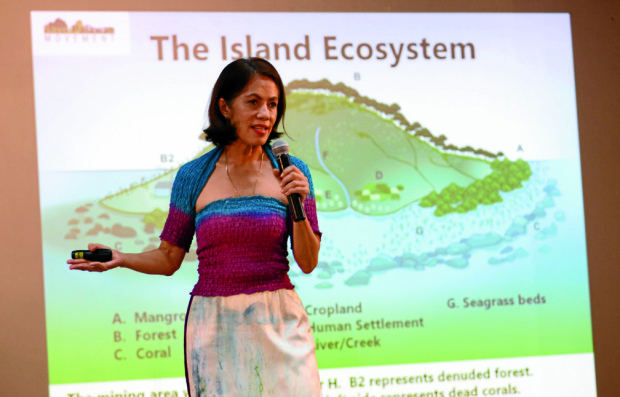No eviction of tribal folk
Indigenous people (IP) fearing eviction from their ancestral domains have found an ally in Environment Secretary Gina Lopez.
In a recent dialogue with the indigenous peoples who have been camping out at the University of the Philippines in Diliman, Quezon City, for the past month to highlight the plight of minorities, Lopez assured the tribal folk: “No one will be evicted from your land. That is your exclusive right.”
“Why would you be evicted? Those are your lands. What we want is for you to work there and improve your lives,” Lopez said, prompting applause from the gathered crowd.
Mining operations
Article continues after this advertisement
Lopez made the statements as some indigenous groups protested the what they said was the encroachment of corporations and the military in their ancestral lands.
Article continues after this advertisementThe indigenous people called for the closure of mining operations in their areas, saying it destroyed the environment, their ancestral domain and their livelihood. The Mangyans from Mindoro specifically mentioned a mine operated by Intex, while the Kankanaey, Bago and Ibaloi tribes of Northern Luzon said they were against mines operated by Lepanto, OceanaGold and Golden Summit.
Manobos from Caraga and representatives from Compostela Valley also called for justice for the killings of activists and advocates in their areas, including the recent killing of antimining advocate Jimmy Saipan.
Lopez directed her Undersecretary for Field Operations, Isabelo Montejo, who had accompanied her to the camp, to look into the issues being raised by the indigenous folk.
Conserving practices
Meanwhile, moves are underway to institutionalize indigenous peoples’ conservation practices.
The Department of Environment and Natural Resources Biodiversity Management Bureau (DENR-BMB) launched on Tuesday the Philippine Indigenous Communities-Conserved Areas (ICCA) project, which recognizes and formalizes, as among the government’s conservation strategies, traditional practices and customs of indigenous peoples in ancestral domains within key biodoversity areas in the Philippines.
Protected areas
“We acknowledge that because of their affinity with nature, indigenous peoples have traditions that intrinsically show respect for the environment and preserve it,” said DENR-BMB director Theresa Mundita Lim, at the ICCA project launch in Quezon city.
According to data from the DENR-BMB, 1,444,000 hectares of ancestral lands are within protected areas. “When we mapped areas rich in biodiversity, we found these areas are in ancestral domains. This is why eventually, we need to recognize their traditions to help in taking care of biodiversity,” Lim said.
In his message, Ola Almgren, United Nations Development Program (UNDP) resident representative in the Philippines, noted the Philippines is “globally recognized as a center of biodiversity.”
The project’s $6,776,723 budget was made possible through the assistance of the United Nations Development Program, and the Global Environment Facility. Lim said that the NCIP, the agriculture department’s Bureau of Fisheries and Aquatic Resources, and respective local government units would be the BMB’s co-implementers on the project.
Ethnographic regions
The project will be implemented until 2019 in 10 biodiversity areas in the seven ethnographic regions in the country: Mt. Taungay in Tinglayan, Kalinga; Mt. Polis in Hungduan, Ifugao; Mt. Imugan in Santa Fe, Nueva Vizcaya; Egongot in Maria Aurora, Aurora; Kanawan in Morong, Bataan; Balabac in Palawan; Mt. Kimangkil in Impasug-ong, Bukidnon; Mt. Apo in Magpet, North Cotabato; Mt. Diwatain Esperanza, Agusan del Sur; and Dinarawan in Jabonga, Agusan del Norte.
Ifugao representative Teddy Baguilat Jr., author of House Bill 115 or the Philippine ICCA Act, said the measure stressed the government’s recognition not only of indigenous ancestral areas, “but also indigenous knowledge and practices.”
